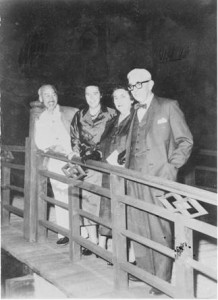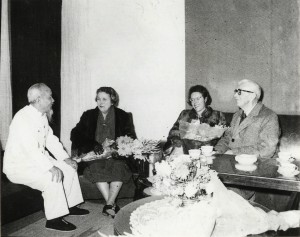9th November 2015 Hanoi, Vietnam
The Rule of Law
The UK and Vietnam don’t have much in the way of shared history. Sometimes that makes my job harder; sometimes easier. But last week, an all-star cast gathered in Hanoi – the Prime Minister’s Trade Envoy, Lord Puttnam; the Vietnamese Minister and Vice Minister of Justice; a former British High Court judge; and most of the local British business community – to celebrate one fascinating historical episode. And to explore the underlying theme, which is one that still matters today.
In 1931, Ho Chi Minh was 20 years into his “30 year journey”, which would see him spend time in Britain, France, China, Russia, Thailand and the USA before returning to Vietnam in 1941 to lead the fight for independence. Arriving in Hong Kong, at that time still under British colonial rule, he was arrested by the authorities at the behest of their French counterparts in Vietnam, where Ho had been sentenced to death in absentia.

History might have been very different had Ho been handed over to the French. That this didn’t happen was down, in large part, to the efforts of his British solicitor, Francis Loseby, and barrister, F.C. Jenkin. Loseby and Jenkin fought tooth and nail in the Hong Kong courts to have Ho released. After their action was eventually dismissed, they appealed to the Privy Council in the UK – at the time, the highest court in the British Empire. In 1933, the case was settled out of court, with the Crown agreeing that Ho Chi Minh could leave Hong Kong by any route he pleased. With the French still hoping to arrest Ho as soon as he left Hong Kong waters, Loseby did his client one final service, helping him board a ship to China disguised as a wealthy Chinese merchant.
Loseby and Ho Chi Minh never lost touch. A famous picture, of a beaming President Ho welcoming Loseby, his wife and daughter to Hanoi in 1960, hangs on the wall of my office; I’m looking at it as I write this blog. But this isn’t just a story about a narrow escape, or an unlikely British-Vietnamese friendship. It’s really a story about the value of the Rule of Law.

The legal processes which followed Ho Chi Minh’s detention in Hong Kong embodied the Rule of Law in action: the fundamental principle that every citizen is entitled to due process, and that even governments must act within the constraints of the law. As well as protecting individual rights, the rule of law underpins good governance, accountability and prosperity. World Bank studies have shown a close correlation between the rule of law, underpinned by a strong and independent judiciary and court system, and levels of economic development.
The Rule of Law is a hot topic in Vietnam at the moment. The case of Le Van Manh, sentenced to death for murder on the basis of a confession which he claims was extracted under torture, has been referred back to Vietnam’s Supreme Court for review. Deputies in the National Assembly have raised concerns about the prevalence of beating suspects to obtain confessions, and proposed the introduction of a right to remain silent. And with Vietnam having agreed a number of ambitious free-trade deals this year, including with the EU, the rule of law in the commercial sphere will become ever more important. The agreements should carry huge benefits for Vietnam’s economy – but international investors and trading partners need to be confident in the fairness and effectiveness of the Vietnamese legal system.
So what better way to emphasise the importance of the Rule of Law, and to celebrate a British solicitor’s contribution to the history of modern Vietnam, than with a lecture series named after Loseby himself? Conceived and organized by the British Business Group Vietnam, and brought to fruition with the help of Lord Puttnam and the Vietnamese Ministry of Justice, last week saw the inaugural Loseby Lectures in Hanoi and Ho Chi Minh City. The speaker was former High Court judge Sir Nicholas Stadlen, who set out the story of Ho’s legal battles in Hong Kong, before exploring how the concept of the Rule of Law in the UK has evolved from Magna Carta 800 years ago, to the present day. Part legal history lesson, part courtroom drama, it was the perfect start to what should become an annual series of lectures focusing on Rule of Law themes. I hope that it will last as long as the friendship between Ho Chi Minh and Francis Loseby!
I so wish my eldest daughter, Winter Loseby,
a law student had known about this…
I so wish my eldest daughter, Winter Loseby, a law student had known about this…
Fascinating article. Proud to see that the our legal system and history of jurisprudence is respected throughout the world. One of our best exports, perhaps!
Dear Ms Tam – I’m really glad to hear that you enjoyed the lecture in Ho Chi Minh City. The British Business Group Vietnam is still working with the lecturer to finalise the transcript, and I believe this will be available via their website in due course. With best wishes, Giles
Dear Sir,
May I offer my warm and respectful greetings to the Foreign & Commonwealth Office and yourself.
Currently I work as a legal practitioner in Ho Chi Minh City, Vietnam.
I attended the Loseby Lecture event in Ho Chi Minh City on 5 November 2015 and have found that the presentation by Sir Nicholas Stadlen is truly wonderful and useful for my research.
It is the Loseby Lecture that recalls my desire for study and exploration of Magna Carta, UK’s history and shared culture between UK and Vietnam. So I would very much like to acquire the script of the presentation by Sir Nicholas Stadlen. It would be grateful if you could please send the script to me via my email.
I thank you for your consideration and very much look forward to the upcoming event of the lecture series on Rule of Law themes.
Many thanks and kind regards,
(Ms) Tam
A thought-provoking article!